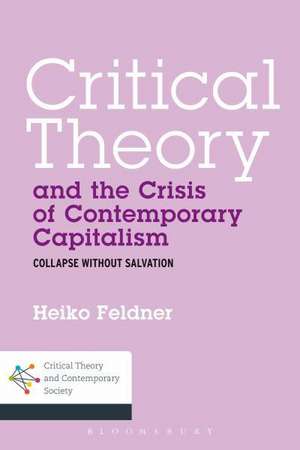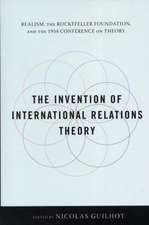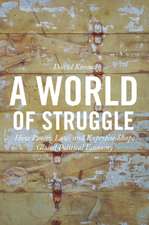Critical Theory and the Crisis of Contemporary Capitalism: Critical Theory and Contemporary Society
Autor Heiko Feldner, Dr Fabio Vighien Limba Engleză Hardback – 17 iun 2015
Din seria Critical Theory and Contemporary Society
-
 Preț: 208.70 lei
Preț: 208.70 lei -
 Preț: 345.05 lei
Preț: 345.05 lei -
 Preț: 155.55 lei
Preț: 155.55 lei -
 Preț: 206.64 lei
Preț: 206.64 lei -
 Preț: 177.90 lei
Preț: 177.90 lei -
 Preț: 155.23 lei
Preț: 155.23 lei - 23%
 Preț: 536.90 lei
Preț: 536.90 lei - 23%
 Preț: 536.99 lei
Preț: 536.99 lei - 22%
 Preț: 256.59 lei
Preț: 256.59 lei - 12%
 Preț: 278.94 lei
Preț: 278.94 lei - 22%
 Preț: 257.21 lei
Preț: 257.21 lei -
 Preț: 278.32 lei
Preț: 278.32 lei - 13%
 Preț: 255.29 lei
Preț: 255.29 lei - 22%
 Preț: 832.65 lei
Preț: 832.65 lei - 22%
 Preț: 889.88 lei
Preț: 889.88 lei -
 Preț: 237.75 lei
Preț: 237.75 lei - 13%
 Preț: 254.75 lei
Preț: 254.75 lei
Preț: 771.26 lei
Preț vechi: 1111.43 lei
-31% Nou
Puncte Express: 1157
Preț estimativ în valută:
147.58€ • 154.50$ • 122.11£
147.58€ • 154.50$ • 122.11£
Carte tipărită la comandă
Livrare economică 05-19 aprilie
Preluare comenzi: 021 569.72.76
Specificații
ISBN-13: 9781441189097
ISBN-10: 1441189092
Pagini: 160
Dimensiuni: 152 x 229 x 11 mm
Greutate: 0.38 kg
Editura: Bloomsbury Publishing
Colecția Bloomsbury Academic
Seria Critical Theory and Contemporary Society
Locul publicării:New York, United States
ISBN-10: 1441189092
Pagini: 160
Dimensiuni: 152 x 229 x 11 mm
Greutate: 0.38 kg
Editura: Bloomsbury Publishing
Colecția Bloomsbury Academic
Seria Critical Theory and Contemporary Society
Locul publicării:New York, United States
Caracteristici
Offers a new reading of key theorists, including Benjamin, Marx, Foucault, and Zizek
Notă biografică
Heiko Feldner is co-director of the Centre for Ideology Critique and Zizek Studies at Cardiff University, UK. He is also the General Editor of Bloomsbury's Writing History series on historiography and historical theory, and a Fellow of the Royal Historical Society, London. He is the author of Zizek: Beyond Foucault (with F. Vighi, 2007).Fabio Vighi is Senior Lecturer and co-director of the Zizek Centre for Ideology Critique at Cardiff University, UK. He is the author of Zizek: Beyond Foucault (2007, with Heiko Feldner), Sexual Difference in European Cinema (2008), and On Zizek's Dialectics: Surplus, Subtraction, Sublimation (2010).
Cuprins
IntroductionChapter 1Collapse without salvation?Chapter 2Homo economicus: Greenspan's misanthropy in contextChapter 3Ontology of crisisChapter 4The capitalist discourse: digging its own graveChapter 5Agamben's messianism, or: trouble with the dialecticEpilogue: nothing to be liberatedReferencesIndex
Recenzii
Feldner's and Vighi's new book is what we have all been waiting for - in its diagnosis of the ongoing economic and financial crisis it combines in a masterful way concrete economic analysis with a philosophical and cultural interpretation of today's world. Only such an approach which deals with Alan Greenspan AND Giorgio Agamben will do the work. This is why Critical Theory and the Crisis of Contemporary Capitalism is a book for everyone who wants to understand the predicament we are all in - in short, for everyone who still cultivates a desire to think.
Heiko Feldner and Fabio Vighi use and link two different approaches - Marxian and Lacanian - to analyze the present global crisis. The theoretical connection between a Marxist and a Lacanian approach to the crisis of contemporary capitalism is Zizek, who becomes the methodological and theoretical reference point of the two authors. They compare the most recent studies and discuss the theses of Agamben in order to criticize the theological-political dispositif. The analytical part of the book is very interesting and useful because it allows us to understand the mechanisms of power and control in both the political and economic field and in psychology with the reduction of experience in language and with the control mechanisms of language. They mean that social antagonism and alienation are irreducible aspects of our social being therefore it is nothing to be liberated. The authors know very well as the writings of Marx and those of Lacan and debate with the criticism of recent years as well with philosophical positions of recent past. Simply put, the analysis of the economic, social and psychological crisis contained in this book serves then to clarify what is happening in today society and economy and even in psychology of ego, to understand the mechanisms of politic power and social domination as well of language domination.
Anyone interested in the ongoing global economic crisis will read this volume with great benefit and fascination. Drawing on highly original readings of a range of left-wing political thinkers from Karl Marx to Slavoj Zizek, Heiko Feldner and Fabio Vighi argue that an intelligently re-thought neo-Marxism might have a lot to offer in the current predicament. Not everyone will agree, but no one can fail to be intrigued by their theoretical take on the crisis.
Heiko Feldner and Fabio Vighi use and link two different approaches - Marxian and Lacanian - to analyze the present global crisis. The theoretical connection between a Marxist and a Lacanian approach to the crisis of contemporary capitalism is Zizek, who becomes the methodological and theoretical reference point of the two authors. They compare the most recent studies and discuss the theses of Agamben in order to criticize the theological-political dispositif. The analytical part of the book is very interesting and useful because it allows us to understand the mechanisms of power and control in both the political and economic field and in psychology with the reduction of experience in language and with the control mechanisms of language. They mean that social antagonism and alienation are irreducible aspects of our social being therefore it is nothing to be liberated. The authors know very well as the writings of Marx and those of Lacan and debate with the criticism of recent years as well with philosophical positions of recent past. Simply put, the analysis of the economic, social and psychological crisis contained in this book serves then to clarify what is happening in today society and economy and even in psychology of ego, to understand the mechanisms of politic power and social domination as well of language domination.
Anyone interested in the ongoing global economic crisis will read this volume with great benefit and fascination. Drawing on highly original readings of a range of left-wing political thinkers from Karl Marx to Slavoj Zizek, Heiko Feldner and Fabio Vighi argue that an intelligently re-thought neo-Marxism might have a lot to offer in the current predicament. Not everyone will agree, but no one can fail to be intrigued by their theoretical take on the crisis.















